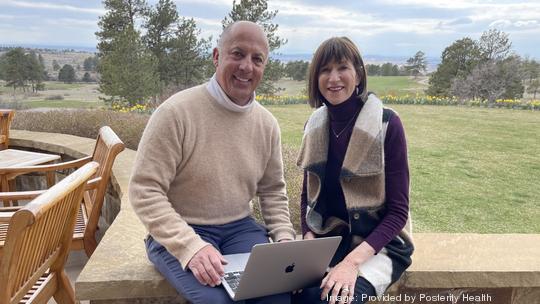
A digital male fertility platform created in Parker raised $6 million in seed funding to expand access to fertility care to more states and continue its goal of involving men in conversations about reproductive health.
Posterity Health was established during the Covid-19 pandemic when CEO Pam Pure, a digital health care executive, teamed up with her husband, Barrett Cowan, who's one of only about 200 reproductive urologists in the United States.
The clinic uses telehealth to assess male fertility, offer educational resources and treat patients. This digital method helps expand access to male fertility treatment to places where it would typically be unavailable. It also creates an easier pathway to care for men who otherwise wouldn't go into a physical clinic because of the stigma associated with male infertility, Cowan said.
"We need to break that stigma because it turns out that when a couple is having a hard time, half the time it's due to a male factor, but everybody thinks it's a female issue," Cowan said. "With increased awareness of male fertility, we realized that we could really help couples conceive more easily, more quickly and less invasively."
The funding round was led by New York-based Distributed Ventures, an early-stage venture capital fund that focuses on health technology. Several digital health care executives also participated in the round, including Gerry McCarthy, CEO of Merative; Laurie McGraw, the former senior vice president of health solutions at the American Medical Association; and Don Holzworth, chairman of the advisory board at the University of North Carolina Gillings School of Public Health.
The American College of Gynecology and the American Society of Reproductive Medicine suggest that both men and women be evaluated when facing problems with conception. However, that rarely happens, Cowan said.
According to the American Urological Association, there were 255 reproductive urologists in the country in 2020, and 165 had completed a fellowship in male infertility. Only 6% of counties in the U.S. had a practicing reproductive urologist, and for men in those areas, the wait time to see one can be up to two months.
"So we said we need to create a system where it's easy, accessible, affordable and comfortable," Cowan said.
While Posterity Health has a clinic for Colorado-based patients, most of their work is done through telehealth. Men can order an at-home assessment through the Posterity Health website. The assessment, which costs $199, includes a semen analysis, a telehealth consultation and personalized lifestyle recommendations. The platform is licensed in 26 states, and there are plans to take it nationwide, Pure said.
With the $6 million seed funding, Posterity Health intends to add 10 more states within the next year, as well as hire more sales staff and continue building out its technology platform.
In addition to the lack of health care providers, men don't seek fertility care because conversations regarding infertility aren't typically focused on them, Pure said. Posterity Health aims to make it a "couples issue," rather than placing the burden on women, she said.
"Just yesterday I saw a couple who had been struggling to conceive for 15 months," Cowan said. "We got the guy evaluated, and it turns out the woman was totally fine and there was a male issue that we could fix relatively easily and quickly. But because he wasn't evaluated up front, this process is going to delay the birth of their child for two and a half years."
That situation is relatively common, Pure said. She thinks more men do want to be part of the conversation but aren't aware of how easily they could engage.
"Every week we see women who are just devastated because they've been going through months of evaluations, and then we find out it's not their problem," Pure said. "It's never been more important to have males, who are 50% of the equation, understand their fertility better."




